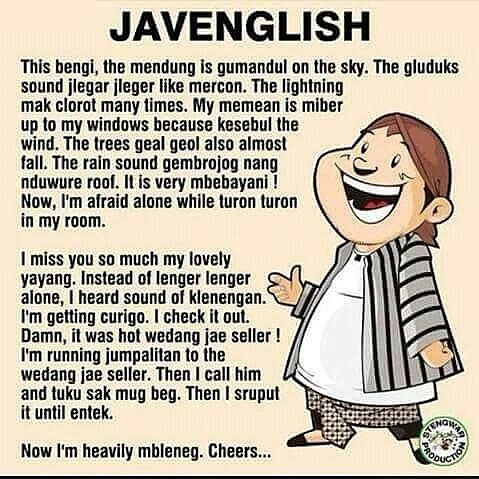My sister, who is in senior high school, texted me couple days ago, “sorry ya bro, aku rak isa mangkat wingi. Iki lagi on the way (I am sorry, brother. I couldn’t go yesterday. I am now on the way)”. As an English teacher born Javanese, I found the text as a very interesting subject to analyze.
In that text, there are two very different languages mixed as one. In linguistics, when there are two different languages come into contact, a new language possibly emerges. This new language is referred as a pidgin language which can potentially become a mixed or hybrid language. This circumstance is what probably happens with English and Javanese with some of its new terms and code switching.
As we are familiar with Singlish, an English version spoken in Singapore, similar cases also happen in Malaysia and most countries in the world. They create their own version of English with its unique dialects or other linguistics features. And considering the massive expansion of English as an international language in Indonesia, it is also important to address whether or not Javanese will eventually undergo the same process.
Javanese is one of 700+ local languages in Indonesia. As part of a very diverse country, Javanese has emerged as one of the most powerful local languages in the nation. According to Subroto, et.al, Javanese is spoken by more than 75 million people worldwide, including in Malaysia, Hong Kong and Suriname. However, Javanese is mainly spoken in the Central Java, Yogyakarta, and East Java Provinces.
Linguistically speaking, the language has several styles or registers depending on its social contexts. Each style employs its own vocabulary, grammatical rules and even prosody. The grammar and structure of Javanese language relies on the area where it is spoken and speakers involved in a given context. According to the styles, the language is categorized into three major registers, namely Ngoko, Madya, and Krama. This category is made based on the degree of politeness and contextual situation where the language is used.
For most Javanese people, the language is believed to have high moral values and ethics. According to Hastangka, the language contains mystical and philosophical dimensions which serve as Javanese way of life. Additionally, the language is also believed as the expression of tolerance, humility, patience and peace. Therefore, Javanese preservationists are defending the use or “purity” of the language because they see it as a fundamental part of their culture.
However, in recent decades, the Javanese language has encountered some problems. Although UNESCO/Ethnologue mentions that Javanese is not endangered, but Purwoko (2011) states that Javanese is potentially losing its speakers. His argument is based on Kincade’s five-level language systems of danger. The language is under a category stating that it is not effectively passed on to the next generation due to lackluster efforts to preserve it. And Javanese is currently in this particular situation.
As reflected in its daily use, there seems to be a declining trend, particularly for young people in big cities to speak in Javanese, especially for higher styles (madya and krama). There are some factors leading young learners to lose interest in the language, including the limited number of competent teachers of this language, complexity of learning material and the stereotype amongst students that Javanese is mainly used by old people.
In a quite opposite situation, studying English attracts more enthusiasm as it is compulsory for Indonesian students. The Indonesian national curriculum had issued a mandate stating that English is one of the mandatory subjects to be included in national exams, along with mathematics and bahasa Indonesia (as the national language). In higher education institutions, students are required to master English, especially as part of their courses and writing final projects. Mastery of English is significant to helping students reading international publications related to their areas of study.
Some experts are concerned that massive expansion of English will eventually contribute to the erosion of local languages, not only Javanese but also other vernaculars. The interaction between the dominating and dominated languages must be assessed carefully.
Interestingly, notwithstanding its effect on local language, Indonesian people seem to embrace the fact that English is widely expanding. Some experts believe that this is due to media which has central influence in such conditioning. As we can see, the spread of international news, the expansion of Hollywood, and socio-economic interaction between different countries play a significant part in expanding the use of English.
However, the mastery of English as an international language has potential for the spread of Javanese as well. By using English, Javanese scholars can publish their work internationally and reach wider audiences. The introduction of Javanese culture can be carried out using English.
In response to the existence of Javenglish, it is therefore central to ensure there is comprehensive protection for Javanese as one of Indonesia’s local national languages. The government, educators, and private society must work hand in hand in realizing these programs. Government must regulate policies about the use of local languages.
In regard to education system, teachers must be trained as professional instructors of local languages by arming them with comprehensive understanding through seminars, books, and other programs. Teachers also need to comprehend how to create strategic learning materials and curriculum development which enhance students’ awareness in practicing the language. On the local level, communities should develop supporting programs for local language preservation, such as “language days” and social gatherings for Javanese language immersion. Society, especially family, plays a central role for young generations to practice and learn both local and global languages.
Eventually, through these steps, the use of Javenglish will not appear as much as a threat because people are ready to turn this hybrid language into positive change.

